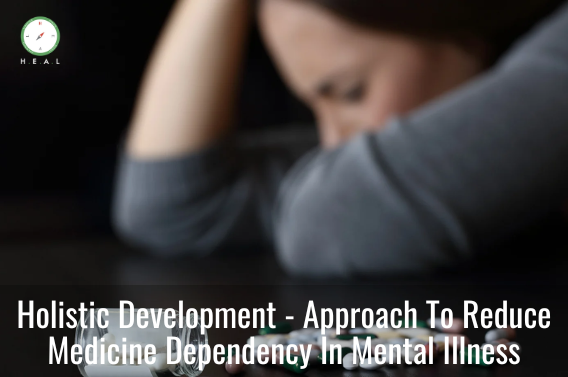Mental health can affect daily life, personal relationships, and physical health. According to the World Health Organization (WHO) “Mental health is a state of well-being in which an individual realizes his or her own abilities, can cope with the normal stresses of life, can work productively, and can contribute to his or her community.”

People suffering from lower mental health conditions, depression and anxiety need to deal with many emotional and behavioral challenges every day. Restoring mental health is essential on an individual basis, as well as throughout different countries, communities, and societies all over the world. Everyone has different trouble developing a mental health disorder, despite their age, sex, income, or ethnicity. Being capable of identifying these difficulties is one of the major objectives of a holistic approach to mental health.

A mental health holistic development approach to mental health focuses on providing support and comfort to the patient through therapeutic activities along with medication. This development approach puts the patient, not their diagnosis or their symptoms, at the center of their treatment plan. The support for holistic methods to accomplish mental wellness has increased nowadays. It is becoming increasingly popular because it considers all aspects of a person, speculating not just the symptoms and diagnosis but also social and emotional factors. That is why it is sometimes referred to as holistic psychotherapy or body-centered psychotherapy.

The holistic development approach is an integrative type of therapy that incorporates both traditional and non-traditional therapeutic treatments to help the individual as a whole.
During interaction therapy, patients are treated by a certified mental health therapist in a one-to-one setting, during which they work through concerns, mental health symptoms, and behaviors. Over time, interactive therapy can alleviate emotional and mental health symptoms and help patients resolve personal issues with professional support.
Art therapy encourages patients to express themselves and explore their diagnosis, symptoms, and behaviors through painting, drawing, and journaling. Through this therapy, the professional helps bring light to the patient's deeper, subconscious emotions.
Mindfulness helps people build awareness about their diagnosis and experiences and become more active in their lives. Through the help of professional therapists, mindfulness is practiced, and people can set an intention to cultivate self-awareness, bring attention to their emotions and sensations, and shape their attitude so they can work through issues in a non-judgmental frame of mind.
Somatic therapy is a body-centric approach that utilizes strategies such as breath work, dance, Zumba, and meditation to heal trauma, stress, and other mental health.
Spiritual therapy is an approach that incorporates belief systems in the almighty and spiritual faith to overcome all the problems that a person faces in their life.
Changes in lifestyle and food habits can work radially. Various nutritional foods and supplements can heal mental disorders and bring self-attention. Changes in these areas can also help reduce anxiety, insomnia, acute depression, and mood swings.
Experts in this therapy make you learn how to manage stress. Stress is usually a catalyst for many mental health disorders. Effective stress management is also essential in moving a patient toward wellness in every area of their life.
holistic therapies are also based on the idea of an energy workout, which focuses on correcting inequalities and blockages in the body’s natural flow of energy. Reiki and acupuncture are examples of energy work in holistic therapy.

Researchers have found that mental health holistic development approaches can develop health outcomes by relieving psychological distress and pain and improving the medication system and family relationships.
Interactive therapy supports everyday living and reduces the risk of isolation and self-harm. It can help people understand the root of their mental illness and start to work on more beneficial thought patterns
Stress regulation by using holistic development treatments is important to reach the way to wellness, as stress is the biggest stimuli for mental health issues.
Moving to physical activities and a balanced diet can be extremely effective in obliterating symptoms of anxiety, depression, and mood swings, and can boost sleep quality, as insomnia or poor sleep causes a lot of mental disorders.
Holistic approaches help the mind in becoming a healing tool. By preparing your mind for responding differently to a situation of provoking stimulus, it can be simply as efficient in relieving symptoms as psychotropic medicines.
Mindfulness releases natural chemicals and challenges a patient to focus on their breath and be attentive to the movement. There are also several free online resources such as the Depression and Bipolar Support Alliance.
Eminent Kolkata-based health transformation coach Vidhi Beri has been working for years with patients with certain mental disorders and the process of healing. To know details about her work please visit the official website http://www.vidhiberi.com/.